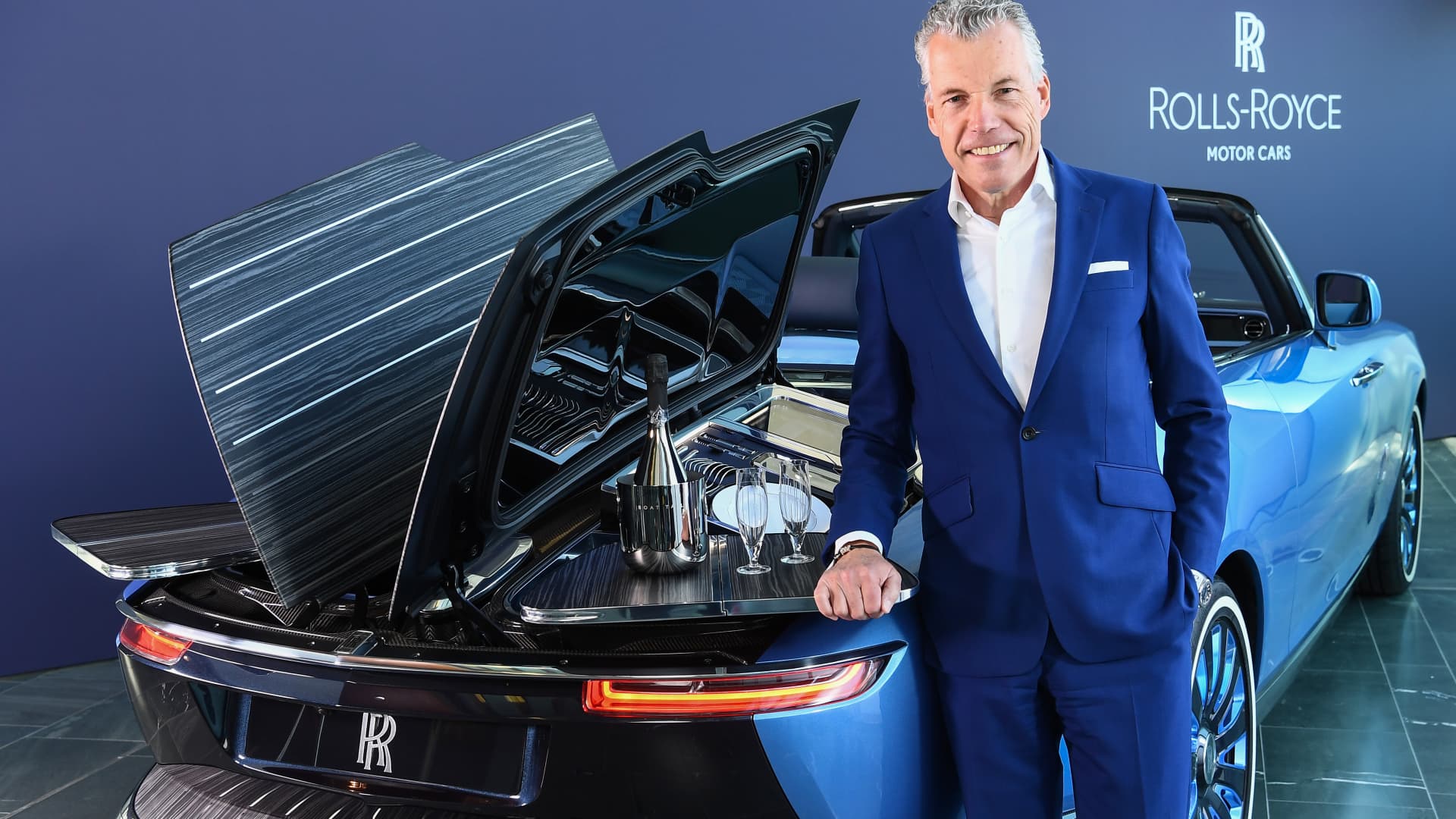Torsten Muller-Otvos, the Rolls-Royce CEO who turned an aging brand into a coveted badge of success for pop stars, athletes and young entrepreneurs, is retiring after 14 years.
Rolls-Royce announced Thursday that Muller-Otvos, 63, the longest serving CEO of Rolls-Royce in nearly a century, will retire on December 1. He will be replaced by Chris Brownridge, currently chief executive officer of BMW UK.
Muller-Otvos brought new shine to the Rolls-Royce brand and became a leader in the luxury world by attracting a new generation of wealthy buyers. With sleek models like the fast-back Wraith, and edgy design schemes like Black Badge, Rolls-Royce’s sales grew more than six-fold during his tenure, from 1,000 cars sold in 2010 to more than 6,000 last year.
The average age of a Rolls-Royce buyer fell from 56 to 43. One in five buyers today is a celebrity.
“The brand is contemporary today, I would say cool again,” Muller-Otvos told CNBC. “That indicates to me that we got it right, not just me but the entire team. That makes me extremely proud as I look back and see what a fabulous, fabulous journey we had.”
Muller-Otvos also launched Rolls-Royce into its next big chapter with last year’s unveiling of the first fully electric Rolls, called Spectre. The two-door, 577-horsepower behemoth can do zero to 60 in 4.4 seconds and is already sold out in the U.S. through 2025, despite its steep price of over $413,000.
The big question going forward for Rolls is whether it can maintain its cool factor, and strong sales, if the U.S. economy starts to falter. The U.S. remains its largest market, and while Mutter-Otvos said demand and orders remain strong, the company is always prepared for a correction.
“The luxury market is not immune against any any recessionary developments,” he said. “For us, the business is still very strong, but it is on a different level compared to what it used to be right after the pandemic. I would say that has normalized now to levels we are used to, but we are still in a very strong position.”
Muller-Otvos is the longest-serving CEO of Rolls-Royce since Claude Johnson, who brought Charles Rolls and Henry Royce together in 1904 and served until 1926.
Muller-Otvos said when he joined Rolls-Royce, it was an elite brand that was aging fast. Its signature, the four-door Phantom, was designed for chauffeurs to ferry around members of the graying leisure class smoothly and silently. Muller-Otvos visited private bankers around the world to find out how the wealthy were quickly changing — especially with the rise of tech wealth.
“That was quite an eye-opening moment,” he said. “All the private banks told me their clients were getting younger, far more informal and with a lot more women. We said to ourselves, we need something to attract this younger consumer. It needed to be rejuvenated. That’s not something you can do in just two years. That is a long, long story that takes many years to achieve.”
In 2013, Rolls-Royce unveiled the Wraith, a racy, two-door coupe with a twin-turbo V12 that was designed for the wealthy to drive, rather than to be driven in.
That was followed in 2015 by the Dawn convertible, and in 2019 by the Cullinan SUV, which became a favorite of NBA stars and other big athletes. Rolls-Royce debuted the Black Badge line in 2016, featuring higher performance and an all-black color scheme (including the famous Spirit of Ecstasy hood ornament).
Muller-Otvos also ushered in a new era of customization, which lured new customers and bigger profit margins. Dubbed “Bespoke,” the program allows Rolls-Royce buyers to choose their own fabrics, paint colors, materials and interior lighting schemes to make a one-of-a-kind Rolls.
The customization program is one reason the average sale price of a Rolls-Royce has doubled since Muller-Otvos took over, to about 500,000 euros.
“None of our clients want just a product off the shelf,” he said. “They want it to carry their individual signature and their individual story. We have put a lot of resources into Bespoke and now every car leaving [our factory] is fully bespoke.”
